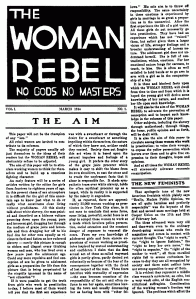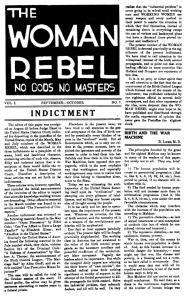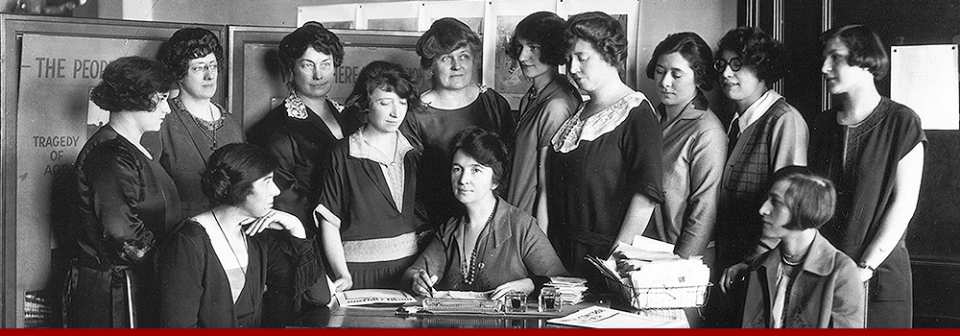It was in March 1914 that Margaret Sanger published the first issue of her radical, anarchist monthly, The Woman Rebel. Edited and published by Sanger, who sought to educate and raise the consciousness of working women through a newspaper  devoted to their specific needs. Emblazoned with the slogan, “No Gods, “No Masters,” it was designed as a call to arms for working-class women.
devoted to their specific needs. Emblazoned with the slogan, “No Gods, “No Masters,” it was designed as a call to arms for working-class women.
From its first appearance that March, The Woman Rebel generated controversy, as each issue included discussions of such radical issues as the use of violence as a tool of striking workers to women’s right to sexual freedom. Sanger used the journal to assert that every woman had a right to be “absolute mistress of her own body,” including the right to practice birth control, a term coined for The Woman Rebel.
A statement the first issue of Sanger’s intention to publish birth control information in the journal quickly drew the attention of postal authorities. They notified Sanger in April 1914 that she had violated obscenity laws. Sanger responded in the May issue by declaring that The Woman Rebel was “not going to be suppressed by the Post Office until it has accomplished the work which it has undertaken.” Three months later Margaret Sanger was formally indicted for violating the Federal Comstock Law. Unwilling to risk spending 20 years in jail, Sanger got on a train to Canada, acquired a false passport and sailed to England under the name “Bertha Watson.”
As her actions garnered attention and support for her fledgling movement, Sanger finally  returned to New York to stand trial in 1915. But within a few months, her five-year old daughter, Peggy, died of pneumonia. As expressions of sympathy poured in, notable friends and supporters sent letters and petitions to President Woodrow Wilson affirming their support for Sanger, while others raised defense funds. With the intensified coverage of The Woman Rebel case and the birth control movement, the government decided to avoid further publicity and decided not press charges.
returned to New York to stand trial in 1915. But within a few months, her five-year old daughter, Peggy, died of pneumonia. As expressions of sympathy poured in, notable friends and supporters sent letters and petitions to President Woodrow Wilson affirming their support for Sanger, while others raised defense funds. With the intensified coverage of The Woman Rebel case and the birth control movement, the government decided to avoid further publicity and decided not press charges.
Only eight issues of The Woman Rebel ever published, it was was one if the first publications to focus specifically on the problems of working women and to articulate a new feminist agenda for the 20th century. And the attention and controversy it generated helped launch a national birth control movement with Margaret Sanger as its leader. One hundred years later, it seems the battle has not yet been won!

Pingback: Too Little, Too Late: The Path To Griswold v. Connecticut | NOTCHES
Pingback: Margaret Sanger, una luchadora por el sexo femenino. | EducaGes
Pingback: 1916: Sanger’s clinic – Site Title
Pingback: Anarchistischer Monatsrückblick: März 2018 | Bodenfrost
Pingback: Anarchistischer Monatsrückblick März 2019 | Bodenfrost
Pingback: The Feminist Legacy of The Woman Rebel – Indy Media
While I am glad you recognize Sanger’s contribution to women, I should make clear that Sanger did not publically advocate for legalized abortion.
Pingback: How This New York Clinic Helped Rework Reproductive Well Being Care - Toadzz - Celebrity, Beauty Tips, Cars And A Lot Of Another Last News
Pingback: How this New York clinic helped rework reproductive well being care - PBS NewsHour - Times of Smithtown
Pingback: How this New York clinic helped transform reproductive health care – PBS NewsHour - News Buddys
Pingback: How this New York clinic helped transform reproductive health care - PBS NewsHour